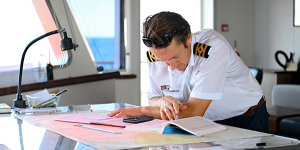Coastal Trading Act – An Unfair Advantage

Over many decades, Coral Expeditions owners and management have made active representation to government across all levels about the potential threat posed to the Australian flagged expedition fleet and its seafaring crew from the entry of foreign-flagged and crewed vessels who have been increasingly participating in the domestic travel economy and enjoying the immense benefit of outdated legislation allowing them to compete head to head without meeting the same standards for wages, safety compliance or taxation. In more recent months, the federal government has openly announced its intention to review key areas of this legislation on public record and in various delegations that we have made to Canberra. Now is a critical time for our industry.
The domestic cruise industry operates under The Coastal Trading “Revitalising Australian Shipping” Act of 2012, which currently permits a range of exemptions for foreign-owned cruise lines in Australia allowing them to operate with cheap labour and tax minimisation practices. Of specific concern is the section 11 Large Cruise Ship exemption which effectively allows any vessel above 5000 Gross Tonne to trade openly in Australian waters. Australian flag vessels such as the Coral Expeditions fleet and many smaller Kimberley operators are held to higher standards of marine safety and regulation than foreign vessels and this is putting the domestic cruise industry and thousands of jobs that go with it at great risk. Post-pandemic, this has become an existential threat to the Australian fleet as many newly built foreign luxury lines have rushed at the opportunity to deploy into the region targeting Australian customers. Foreign vessels take advantage of this regulation and have expanded their reach into sensitive environmental and cultural coastlines of Australia with little experience and by replicating the itineraries of local lines. In almost all instances these cruise lines are on sale and taking customer deposits despite having no approved licences and permits in place at a federal level or with regional government authorities or landowner groups. As a specific example, the current large cruise ship exemption expires on December 31st, 2024, yet at least 8 mid-size foreign ships are actively representing themselves as being approved and licensed to operate in the Kimberley in 2025.
In a recent advocacy discussion, Coral Expeditions Commercial Director Jeff Gillies has stated “The current trading environment is akin to an overseas airline flying local domestic routes in competition with Australian carriers. In the aviation sector, this simply would not be tolerated by authorities. Or alternately a foreign entity owning an Australian island resort whilst paying foreign wages. This does not pass any pub test. We’re not anti-competition but there needs to be an evening up of the playing field”.
Now is the time for a change in the Act and for a modernisation of aged terms that were established some 20-plus years ago to attract mega liners to be able to trade along the eastern seaboard. Coral Expeditions and a cohort of other Australian flagged vessels are making submission with proactive recommendations to modernise the act and to address the issues in the following areas.
- Lift the large cruise ship exemption from the old 5000 GT and 100 passenger limits to a more appropriate 30,000 GT and 300 passenger limits.
- Require vessels under this size to apply for a Temporary Coastal Trading Licence or to register on the Australian general register.
- Create new legislative definitions for passenger carriage as opposed to the current definition of people being classified as freight with a notional spoilage date if not carried from certain ports on certain dates.
- Requirement for foreign vessels to pay equivalent wages to Australian workers whilst operating domestically and to be held to the same standards of tax, super, mandated training, insurance, workers compensation, roster cycles and leave which would effectively increase their crewing costs by some 60% in line with local operators.
- Ensure that all vessels have appropriate permits in place prior to going “on sale” so as to not mislead consumers and that these would include federal trading licences, regional environmental and marine licenses and land use permits from traditional owners which are all mandated for Australian operators.
- Development of a classification and access framework that limits access to Australia’s sensitive cultural and environmental coastlines to vessels that can meet safe and respectful environmental and cultural operating standards to protect and conserve these special places.
- Ensure that any Australian flagged operator has standing priority access to anchorages and that foreign vessels strictly adhere to designated routes and anchorages without inhibiting local vessels.
As part of our advocacy, we have also drawn attention to the fact that Coral Expeditions, with its crew base of ~200 Australian seafarers, is one of the countries largest recruiters and trainers of skilled seafarers with a unique position whereby we are able to develop skills and for crew to attain every marine qualification from cadet through to a Masters Unlimited ticket. Allowing the prevalence of foreign passenger ship trade to continue poses threats to the ongoing skilling of the country’s maritime workforce.

So why do we share this information and what can you do as our valued customers and partners?
Part of the battle we face is one of simple awareness. So, we are motivated to bring these matters more openly into the public domain. As you will imagine, the media and PR juggernaut of foreign cruise and industry membership-funded bodies will have a strongly disparate view to us. They will espouse the economic value that foreign cruise lines bring and reference many billions of dollars they generate. What they will fail to mention is that they market mostly to Australians and that economic benefit is actually mostly being shifted away from Australian cruise and tour operators, hotels and resorts and regional tourism communities. Foreign multinationals in the cruise space have a strategy to win share of wallet of Australian customers through aggressive fare promotions whilst repatriating large profits to their offshore owners.
You can assist by simply being aware and we hope that you will continue to choose Australian lines when it comes to your expedition travel. We would also encourage you to lend your support by raising concerns with local federal members and with the office of the Minister for Infrastructure, Transport, Regional Development and Local Government – The Hon Catherine King MP. Contact details are [email protected].






